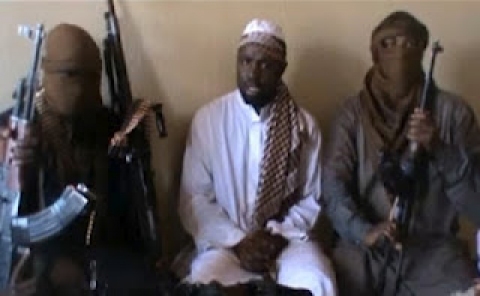The fundamentalist group, Boko Haram on has proposed to dialogue with the federal government and is planning a ceasefire before the commencement of the discussion.

In a telephone press conference in Maiduguri the Borno State capital on Thursday, Abu Mohammed Ibn Abdulaziz, who claimed to be one of the leaders of the group, told journalists that he was speaking for the sect as he has been directed to do so by the leader of the Jama’atul Ahlis Sunna Liddaawati wal Jihad widely known as the Boko Haram.
“If this former governor is arrested, this thing will end as we are highly offended with what happened three years ago”
He claimed that Mr Sheriff, while in office sent securities to arrest and kill most of their members while practising their religion, insisting that most of them are at the moment languishing in various prisons across the country.
He called for compensation as most of their wives and children have been killed while their properties have also been destroyed.
Saudi Arabia venue
The sect he revealed have adopted Saudi Arabia as the neutral venue for the proposed dialogue with the federal government, saying the choice of Saudi Arabia is because the federal government has failed them in the series of the negotiations.
Mr Abdullaziz said five of its members have been mandated to liaise with five members of Borno Elders to find ways of meeting the federal Government to end the insurgency.
He listed the Nigerian mediators to include Shettima Ali Mongonu, General Muhammadu Buhari (Rtd), Bukar Abba Ibrahim, Gaji Galtimari and Barrister Aisha Wakil and her husband.
“The committee members of the dialogue he stressed include; my humble self, Abu Mohammed Abdullaziz, Sheik Abu Abas, Sheik Ibrahim Yusuf, Sheik Sani Kontagora, and Mamman Nur”
Boko Haram, formed in 2009, claims western education is sinful and proposes that interaction with the western world is forbidden and also opposed to the Muslim establishment and the federal government of Nigeria and therefore wages what the sect calls a war against them.
Since August 2011 the insurgency attacks and counter insurgency is reported to have claimed over 2,000 lives. The sect staged a number of attacks on government establishment by planting bombs and using suicide bomb attacks at strategic locations and churches across the northern region of the country.
Jonathan welcomes dialogue
Meanwhile, the Special Adviser to President Goodluck Jonathan on Media and Publicity, Reuben Abati responding to the development confirmed to Channels Television that the presidency has gotten the offer.
“Yes, I have seen the story in which the Boko Haram is reportedly declaring a ceasefire and the opening of dialogue.”
“I think it is important to restate the position of government in this matter. The Federal Government is committed to peace and security for the benefit of all Nigerians. If what the proposed ceasefire is intended to achieve are the objectives of peace and security, then it is a welcome development.”
“Don’t forget that President Jonathan had made it clear that if the people behind Boko Haram are ready to come forward, and table their grievances, then government will be willing to listen to those grievances. “
“There have been attempts before now, by concerned persons to reach out to the Boko Haram through back channels, in response to government’s call that all efforts should be made to resolve the problem. I suspect that this latest development may be related to that. Definitely, government is determined to ensure peace, peace, and peace, and protect the rule of law, and at the same time, see that justice is done where wrongs have been committed” Mr Abati said.

